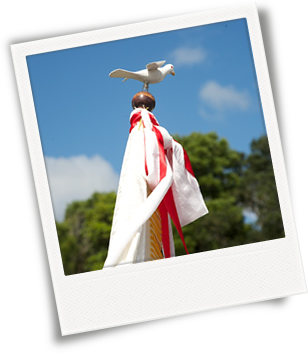Festivities
Religious Festivities
Every weekend, from mid-June to mid-September, there are festivities on Pico Island. Even if the festivities are religious, there is always a secular component to them: brass bands, public auctions, good snacks and a traditional dance called Chamarrita, which is performed in a circle and where someone is charge of leading the dancers. If you happen to find one of these Chamarritas do not be surprised if someone asks you to dance. That is part of the Azorean hospitality.
The remoteness of the islands, as well as the cyclic disasters that they suffered (pirate attacks, diseases, storms, earthquakes, volcanoes) led their inhabitants to seek celestial comfort. To face these adversities, they would turn to the sky, usually to the Holy Spirit, begging for some divine help.

Therefore, the Azorean people express their religiousness in a particular manner in the festivities of the Holy Spirit, celebrated in the 7th Sunday after Easter.
Because this is a very important festivity to our people, the Regional Assembly of the Azores chose the "Monday of the Holy Spirit" to celebrate the Day of the Azores, as a symbol of regional unity.
One of the most important aspects of the festivities in honour of the Holy Spirit is sharing: people share Bread, Meat and Wine in order to keep a promise or to thank for a godsend, usually ascribed to the Holy Spirit. This godsend could be the healing for some health problem, the graduation of a son/daughter, the survival from some catastrophe or a year of good crops.
These festivities start with a mass in which the mordomo, the person who shares the bread, meat and wine with the people, is crowned with the Holy Spirit crown, followed by the Sopas do EspÃrito Santo: a bread and meat soup served to the poorest and to hundreds of guests sitting at the same table. The meal includes soup (the meat is boiled and the bread is soaked in the meat stock), roasted beef, sweet bread, wine and, for dessert, sweet rice.
At the end of day, rosquilhas (a kind of doughnut) and vésperas (a sweet flat bread) are shared with everyone that is taking part in the festivities (arraial) listening to the brass bands or with those who are just passing by.
Many of the parishes of Pico have religious names: Santa Luzia, Santo António, São Roque, Santo Amaro, São João, São Mateus and Madalena. Even the municipal holiday coincides with the day dedicated to the protector saint of each municipality: August 16 - São Roque, July 22 - Santa Maria Madalena, and June 29 - Lajes, whose protector saint is Saint Peter.
Cais Agosto
(em construção)
www.caisagosto.net
Santa Maria Madalena
(em construção)
Semana dos Baleeiros
(em construção)
www.municipio-lajes-do-pico.pt
Festas da costa
(em construção)